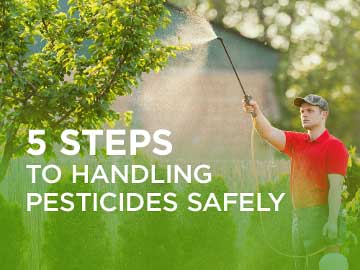- Home
- Loss Control
- Loss Control Insights
- 5 Steps to Handling Pesticides Safely
It’s easy to take chemicals for granted and forget that they can be dangerous—even deadly—when used incorrectly. Although you may not see any ill effects from day-by-day exposure, the long-term effects of handling chemicals incorrectly can cause problems months and years later.
Pesticides—including herbicides, insecticides, rodenticides and fungicides—are frequently used by businesses to control weeds, insects, rodents and molds. While some companies hire experts to take care of weeds and critters, others have maintenance staff or groundskeepers apply chemicals when needed. If your business takes on this responsibility, be sure you also take responsibility for proper application and for worker protection.
EMC Industrial Hygienist Craig Black says that EMC experts who visit organizations do see some misuses of pesticides. He shares these suggestions to assist you in protecting your property, your workers and the environment.
1. Research your needs and search for the best solutions
Choosing the wrong product and incorrectly applying it may cause new problems. Get the best solution by reading labels and ingredients, asking your suppliers questions and exploring alternative methods of handling the issue. As you research, also make sure you recognize the hazards and know how to avoid them. For example, what personal protective equipment (PPE) do applicators need to wear? This may include boots, long pants and shirt, face mask, goggles, respirator, gloves or some combination of these PPE items. The EPA offers guidance in choosing chemical resistant PPE items and so does University of Missouri Extension. Applicators may also need to take special care in laundering clothing after applying chemicals. To research individual chemicals, use this OSHA chemical database or the NPIC list of databases.2. Purchase only what you need
Craig says that some organizations, often schools, purchase too much at one time. “If you are storing the leftovers, many bad things can happen, such as children or employees getting into the pesticides. When left sitting around, the product deteriorates and can lose its effectiveness. If it’s stored in a non-tempered area, extreme heat or cold can change the properties, too,” he says. In addition, disposal can be a problem if you aren’t able to use up all of the pesticide before it loses effectiveness.3. Follow directions to the letter
Reading and following label instructions is critical to ensuring that your workers remain safe. This may include mixing chemicals outdoors or in well-ventilated areas, avoiding spraying on a windy day and applying only when all other workers are out of the area for a period of time. For more on what to look for when reading chemical labels, check out details from the National Pesticide Information Center.4. Avoid causing environmental problems with pesticides
Again, reading labels for proper use and disposing of leftovers correctly can prevent environmental damage. Over-application of herbicides for weed control can cause chemical pollution of waterways. Similar issues can be caused by overuse of other pesticides, both by mixing incorrectly at a too-high concentration or by applying incorrectly.5. Have a plan in place for handling any worker exposure, spills or other problems
Know what the label recommends in case of emergency and have first-aid equipment, products to clean up any spills and emergency contact numbers at the ready. In addition, follow through on any mandatory reporting that may be required to your state pesticide regulatory agency or other agencies.Get in touch
Need help? We’re here for you! Whether you have questions or need personalized assistance, your local office is ready to support you.
Loss Control Insights
Stay informed with the latest news and receive actionable safety tips, all carefully curated by our team of experts.
